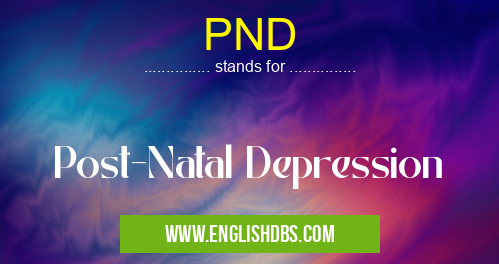What does PND mean in PHYSIOLOGY
Postpartum depression, commonly known as PND, is a type of mental health disorder that affects mothers after giving birth. It is important to understand the meaning of PND so that women can seek help and find support if needed. This article will explain the meaning behind the acronym PND and provide relevant information on this condition.

PND meaning in Physiology in Medical
PND mostly used in an acronym Physiology in Category Medical that means Post-Natal Depression
Shorthand: PND,
Full Form: Post-Natal Depression
For more information of "Post-Natal Depression", see the section below.
» Medical » Physiology
Meaning of PND
PND stands for Postnatal Depression, which is also referred to as perinatal or antenatal depression. This type of clinical depression is most commonly experienced by women in the first weeks and months following childbirth. It is a serious mood disorder characterized by persistent feelings of sadness, despair, emptiness, worthlessness, irritability, and difficulty sleeping or concentrating. Women with postpartum depression may also experience physical symptoms such as digestive issues, headaches, body aches, fatigue or decreased sex drive.
Causes of PND
The exact cause of postnatal depression remains unknown but there are several factors believed to contribute to its development. These include hormonal changes during pregnancy and after childbirth; psychosocial stressors such as relationship problems; financial pressures; lack of social support; sleep deprivation and other lifestyle changes associated with parenthood (including decreased leisure time). Additionally, previous history of mental health issues may increase a woman's risk for developing postpartum depression.
Symptoms and Diagnosis
The many symptoms associated with postnatal depression can make it difficult to distinguish from normal non-pathological “baby blues” which often occurs shortly following childbirth and generally resolves within two weeks. Therefore proper evaluation by a qualified clinician is essential in order to accurately diagnose PND. The main base criteria for diagnosis includes persistent feelings of deep sadness/hopelessness/worthlessness accompanied by an inability to care for oneself or their infant due to the severity of depressive symptoms experienced over an extended period (four weeks or more). Additional criteria must be met in order to confirm diagnosis according to DSM-5 diagnostic guidelines used in psychiatry today.
Essential Questions and Answers on Post-Natal Depression in "MEDICAL»PHYSIOLOGY"
What is Postnatal Depression?
Postnatal depression (PND) is a type of depression that some mothers experience after they have a baby. It is more than just the baby blues, and it typically involves feeling overwhelmed, exhausted, and hopeless about life. It can affect a mother’s ability to care for herself and connect with her baby.
How common is Postnatal Depression?
Postnatal depression affects approximately 10-20% of new mothers. It can occur any time within the first year of a child’s life but often begins in the first three months.
What are the physical symptoms of Postnatal Depression?
Some physical symptoms associated with PND include loss of appetite, difficulty sleeping or insomnia, fatigue, and aches and pains that don't have an identifiable source.
Are there emotional symptoms associated with Postnatal Depression?
Yes. Emotional symptoms associated with PND include feelings of sadness or despair; anxiety or panic attacks; anger or irritability; guilt or shame; difficulty concentrating; difficulty bonding with your newborn; lack of interest in day to day activities; feeling overwhelmed by responsibilities as a mother.
Are there any risk factors for developing Postnatal Depression?
Yes. Risk factors for developing PND may include existing mental health issues such as anxiety or depression prior to pregnancy, stressful life events during pregnancy or shortly after birth, a history of childhood trauma, abuse or neglect, socio-economic stressors such as lack of support from family members or friends, being a single parent, and certain medical conditions such as postpartum thyroiditis.
Can men experience Postnatal Depression too?
Yes - men can also experience postnatal depression (known as paternal postpartum depression). This can be due to intense demands of new parenthood coupled with changes in hormones during the transition into parenthood for both partners. Men may also experience unique stressors related to their roles in parenting their children which can increase their vulnerability to depression.
Is Postnatal Depression treatable?
Yes - PND is treatable through evidence-based treatments such as cognitive behavioural therapy (CBT), interpersonal psychotherapy (IPT), mindfulness-based therapies, psychoeducation/support groups and medication management when needed. Receiving professional help early is important in order to prevent potential long-term consequences on the mother’s wellbeing and her relationship with her baby.
What are the effects on an infant whose mother experiences Postnatal Depression?
Studies find infants whose mothers experienced PND are at higher risk to have poorer cognitive development scores at six months old compared to infants whose mothers do not have PND. They may also be more likely to exhibit disruptive behavior later on during toddlerhood.
Final Words:
Postnatal depression (PND) affects many women after childbirth yet its often overlooked because it shares some similarities with common ‘baby blues’ which has been culturally accepted as part of the process leading up to parenthood. Unfortunately this overlook can be detrimental delaying diagnosis and effective treatment preventing adequate recovery. Therefore it's important for women who are experiencing any signs or symptoms related to postpartum depression - including persistent feelings guilt/ shame/ emptiness - should seek medical help immediately in order receive professional help they need in order improve their well being and quality life.
PND also stands for: |
|
| All stands for PND |
